Company and Securities Law: Analysis of ABC Pty Ltd, COSEC 2019 Report
VerifiedAdded on 2022/11/04
|8
|2269
|83
Report
AI Summary
This report examines a case study involving ABC Pty Ltd, analyzing its financial difficulties and the legal implications. The report delves into the roles and responsibilities of company directors, particularly concerning their duty to prevent insolvency under the Corporations Act. It explores issues such as breach of director duties, the authority of a liquidator, and the validity of contracts. The analysis considers the actions of key individuals like Gregory, the majority shareholder, and the directors, Banjo, Charlie, Delta, Eric, and Felicia. The report highlights the importance of fulfilling the essential elements of a valid contract and the consequences of failing to do so, especially in relation to obtaining a loan. It concludes with an assessment of the liquidator's ability to initiate the winding-up process due to the company's insolvency and the directors' failure to prevent it. The report references relevant case law, including Robinson and Reed Constructions Australia Pty Limited v J F K Interiors Australia Pty Limited, Grant Samuel Corporate Finance Pty Limited v Fletcher, and Balfour v Balfour, to support its arguments.
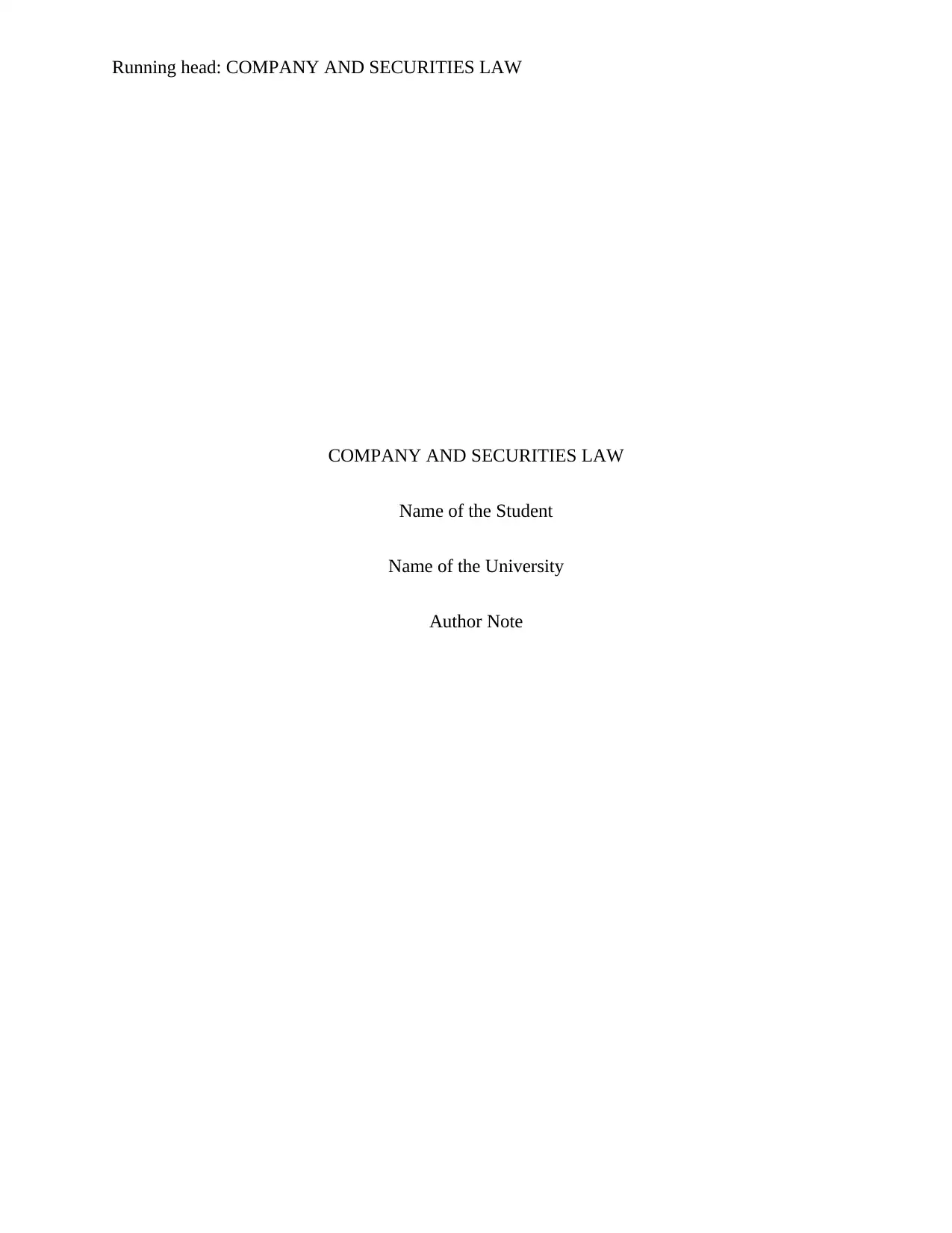
Running head: COMPANY AND SECURITIES LAW
COMPANY AND SECURITIES LAW
Name of the Student
Name of the University
Author Note
COMPANY AND SECURITIES LAW
Name of the Student
Name of the University
Author Note
Paraphrase This Document
Need a fresh take? Get an instant paraphrase of this document with our AI Paraphraser
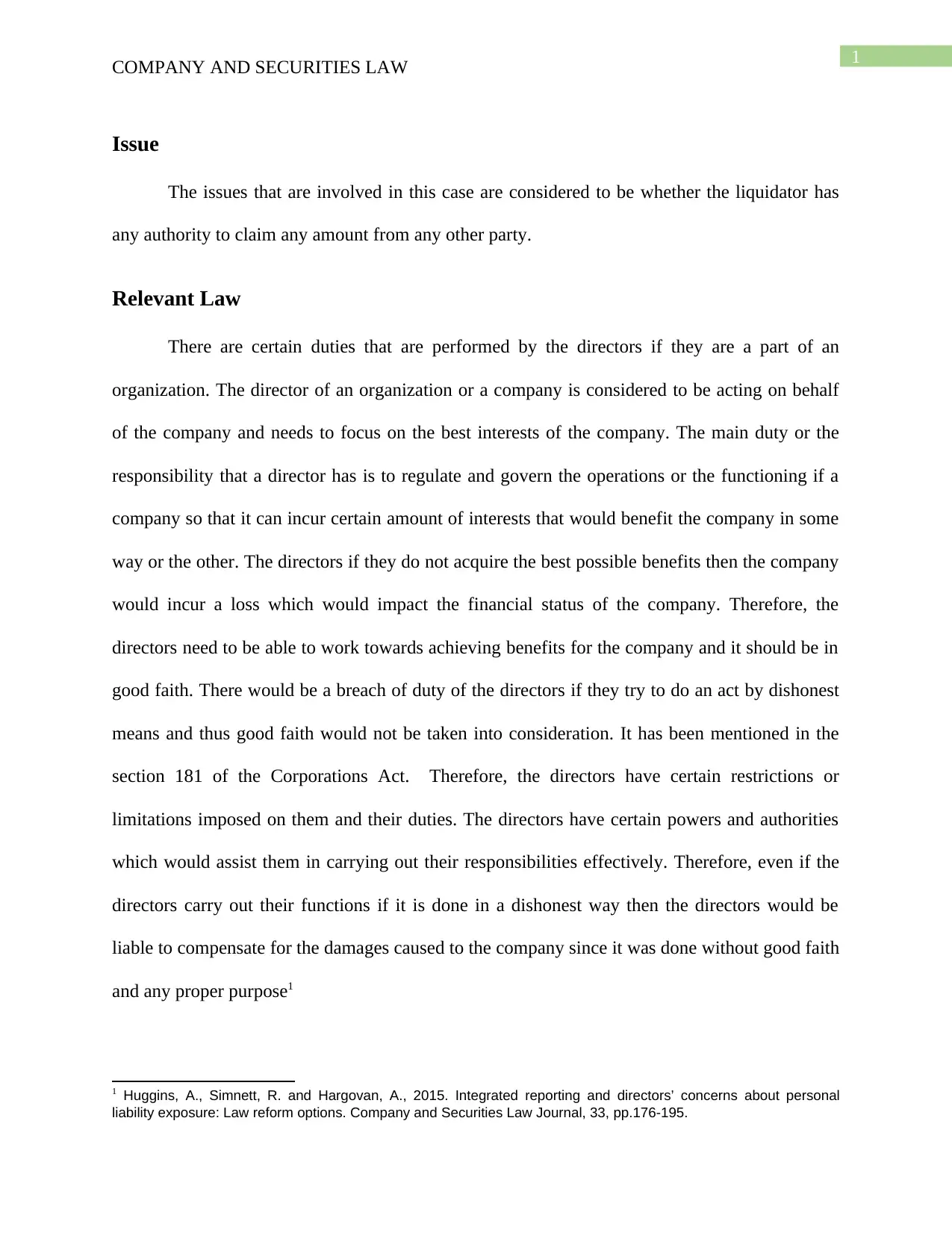
1
COMPANY AND SECURITIES LAW
Issue
The issues that are involved in this case are considered to be whether the liquidator has
any authority to claim any amount from any other party.
Relevant Law
There are certain duties that are performed by the directors if they are a part of an
organization. The director of an organization or a company is considered to be acting on behalf
of the company and needs to focus on the best interests of the company. The main duty or the
responsibility that a director has is to regulate and govern the operations or the functioning if a
company so that it can incur certain amount of interests that would benefit the company in some
way or the other. The directors if they do not acquire the best possible benefits then the company
would incur a loss which would impact the financial status of the company. Therefore, the
directors need to be able to work towards achieving benefits for the company and it should be in
good faith. There would be a breach of duty of the directors if they try to do an act by dishonest
means and thus good faith would not be taken into consideration. It has been mentioned in the
section 181 of the Corporations Act. Therefore, the directors have certain restrictions or
limitations imposed on them and their duties. The directors have certain powers and authorities
which would assist them in carrying out their responsibilities effectively. Therefore, even if the
directors carry out their functions if it is done in a dishonest way then the directors would be
liable to compensate for the damages caused to the company since it was done without good faith
and any proper purpose1
1 Huggins, A., Simnett, R. and Hargovan, A., 2015. Integrated reporting and directors’ concerns about personal
liability exposure: Law reform options. Company and Securities Law Journal, 33, pp.176-195.
COMPANY AND SECURITIES LAW
Issue
The issues that are involved in this case are considered to be whether the liquidator has
any authority to claim any amount from any other party.
Relevant Law
There are certain duties that are performed by the directors if they are a part of an
organization. The director of an organization or a company is considered to be acting on behalf
of the company and needs to focus on the best interests of the company. The main duty or the
responsibility that a director has is to regulate and govern the operations or the functioning if a
company so that it can incur certain amount of interests that would benefit the company in some
way or the other. The directors if they do not acquire the best possible benefits then the company
would incur a loss which would impact the financial status of the company. Therefore, the
directors need to be able to work towards achieving benefits for the company and it should be in
good faith. There would be a breach of duty of the directors if they try to do an act by dishonest
means and thus good faith would not be taken into consideration. It has been mentioned in the
section 181 of the Corporations Act. Therefore, the directors have certain restrictions or
limitations imposed on them and their duties. The directors have certain powers and authorities
which would assist them in carrying out their responsibilities effectively. Therefore, even if the
directors carry out their functions if it is done in a dishonest way then the directors would be
liable to compensate for the damages caused to the company since it was done without good faith
and any proper purpose1
1 Huggins, A., Simnett, R. and Hargovan, A., 2015. Integrated reporting and directors’ concerns about personal
liability exposure: Law reform options. Company and Securities Law Journal, 33, pp.176-195.
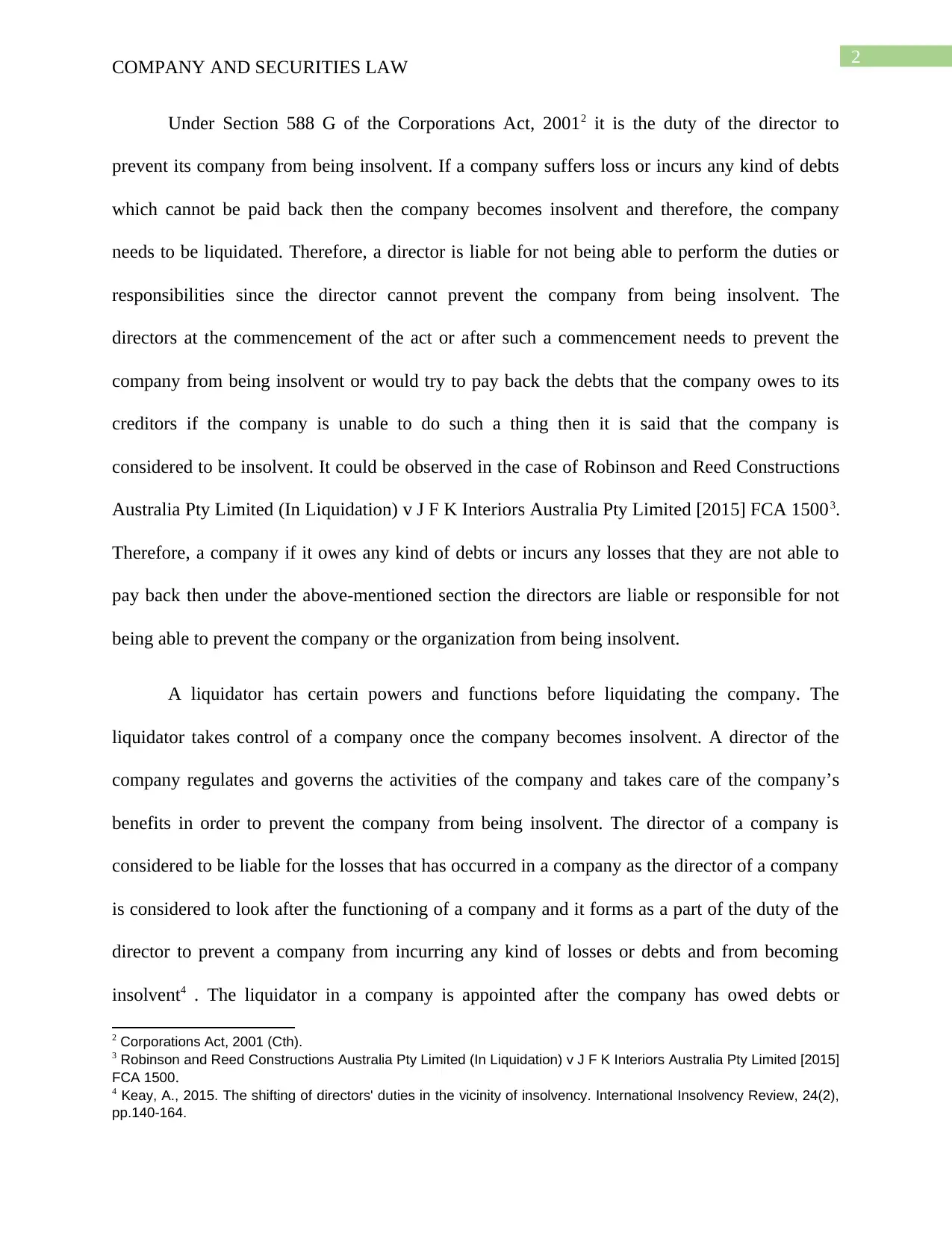
2
COMPANY AND SECURITIES LAW
Under Section 588 G of the Corporations Act, 20012 it is the duty of the director to
prevent its company from being insolvent. If a company suffers loss or incurs any kind of debts
which cannot be paid back then the company becomes insolvent and therefore, the company
needs to be liquidated. Therefore, a director is liable for not being able to perform the duties or
responsibilities since the director cannot prevent the company from being insolvent. The
directors at the commencement of the act or after such a commencement needs to prevent the
company from being insolvent or would try to pay back the debts that the company owes to its
creditors if the company is unable to do such a thing then it is said that the company is
considered to be insolvent. It could be observed in the case of Robinson and Reed Constructions
Australia Pty Limited (In Liquidation) v J F K Interiors Australia Pty Limited [2015] FCA 15003.
Therefore, a company if it owes any kind of debts or incurs any losses that they are not able to
pay back then under the above-mentioned section the directors are liable or responsible for not
being able to prevent the company or the organization from being insolvent.
A liquidator has certain powers and functions before liquidating the company. The
liquidator takes control of a company once the company becomes insolvent. A director of the
company regulates and governs the activities of the company and takes care of the company’s
benefits in order to prevent the company from being insolvent. The director of a company is
considered to be liable for the losses that has occurred in a company as the director of a company
is considered to look after the functioning of a company and it forms as a part of the duty of the
director to prevent a company from incurring any kind of losses or debts and from becoming
insolvent4 . The liquidator in a company is appointed after the company has owed debts or
2 Corporations Act, 2001 (Cth).
3 Robinson and Reed Constructions Australia Pty Limited (In Liquidation) v J F K Interiors Australia Pty Limited [2015]
FCA 1500.
4 Keay, A., 2015. The shifting of directors' duties in the vicinity of insolvency. International Insolvency Review, 24(2),
pp.140-164.
COMPANY AND SECURITIES LAW
Under Section 588 G of the Corporations Act, 20012 it is the duty of the director to
prevent its company from being insolvent. If a company suffers loss or incurs any kind of debts
which cannot be paid back then the company becomes insolvent and therefore, the company
needs to be liquidated. Therefore, a director is liable for not being able to perform the duties or
responsibilities since the director cannot prevent the company from being insolvent. The
directors at the commencement of the act or after such a commencement needs to prevent the
company from being insolvent or would try to pay back the debts that the company owes to its
creditors if the company is unable to do such a thing then it is said that the company is
considered to be insolvent. It could be observed in the case of Robinson and Reed Constructions
Australia Pty Limited (In Liquidation) v J F K Interiors Australia Pty Limited [2015] FCA 15003.
Therefore, a company if it owes any kind of debts or incurs any losses that they are not able to
pay back then under the above-mentioned section the directors are liable or responsible for not
being able to prevent the company or the organization from being insolvent.
A liquidator has certain powers and functions before liquidating the company. The
liquidator takes control of a company once the company becomes insolvent. A director of the
company regulates and governs the activities of the company and takes care of the company’s
benefits in order to prevent the company from being insolvent. The director of a company is
considered to be liable for the losses that has occurred in a company as the director of a company
is considered to look after the functioning of a company and it forms as a part of the duty of the
director to prevent a company from incurring any kind of losses or debts and from becoming
insolvent4 . The liquidator in a company is appointed after the company has owed debts or
2 Corporations Act, 2001 (Cth).
3 Robinson and Reed Constructions Australia Pty Limited (In Liquidation) v J F K Interiors Australia Pty Limited [2015]
FCA 1500.
4 Keay, A., 2015. The shifting of directors' duties in the vicinity of insolvency. International Insolvency Review, 24(2),
pp.140-164.
⊘ This is a preview!⊘
Do you want full access?
Subscribe today to unlock all pages.

Trusted by 1+ million students worldwide
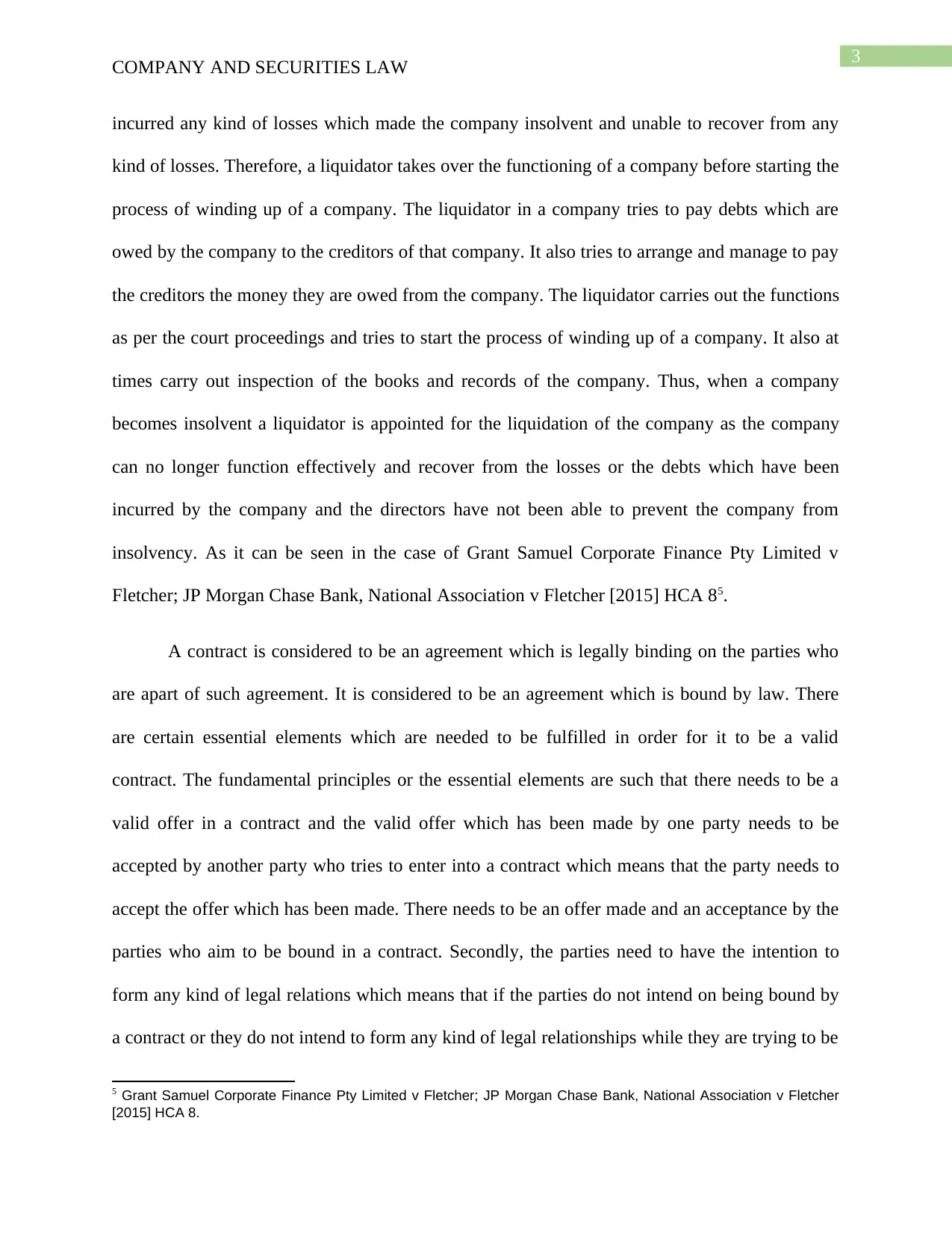
3
COMPANY AND SECURITIES LAW
incurred any kind of losses which made the company insolvent and unable to recover from any
kind of losses. Therefore, a liquidator takes over the functioning of a company before starting the
process of winding up of a company. The liquidator in a company tries to pay debts which are
owed by the company to the creditors of that company. It also tries to arrange and manage to pay
the creditors the money they are owed from the company. The liquidator carries out the functions
as per the court proceedings and tries to start the process of winding up of a company. It also at
times carry out inspection of the books and records of the company. Thus, when a company
becomes insolvent a liquidator is appointed for the liquidation of the company as the company
can no longer function effectively and recover from the losses or the debts which have been
incurred by the company and the directors have not been able to prevent the company from
insolvency. As it can be seen in the case of Grant Samuel Corporate Finance Pty Limited v
Fletcher; JP Morgan Chase Bank, National Association v Fletcher [2015] HCA 85.
A contract is considered to be an agreement which is legally binding on the parties who
are apart of such agreement. It is considered to be an agreement which is bound by law. There
are certain essential elements which are needed to be fulfilled in order for it to be a valid
contract. The fundamental principles or the essential elements are such that there needs to be a
valid offer in a contract and the valid offer which has been made by one party needs to be
accepted by another party who tries to enter into a contract which means that the party needs to
accept the offer which has been made. There needs to be an offer made and an acceptance by the
parties who aim to be bound in a contract. Secondly, the parties need to have the intention to
form any kind of legal relations which means that if the parties do not intend on being bound by
a contract or they do not intend to form any kind of legal relationships while they are trying to be
5 Grant Samuel Corporate Finance Pty Limited v Fletcher; JP Morgan Chase Bank, National Association v Fletcher
[2015] HCA 8.
COMPANY AND SECURITIES LAW
incurred any kind of losses which made the company insolvent and unable to recover from any
kind of losses. Therefore, a liquidator takes over the functioning of a company before starting the
process of winding up of a company. The liquidator in a company tries to pay debts which are
owed by the company to the creditors of that company. It also tries to arrange and manage to pay
the creditors the money they are owed from the company. The liquidator carries out the functions
as per the court proceedings and tries to start the process of winding up of a company. It also at
times carry out inspection of the books and records of the company. Thus, when a company
becomes insolvent a liquidator is appointed for the liquidation of the company as the company
can no longer function effectively and recover from the losses or the debts which have been
incurred by the company and the directors have not been able to prevent the company from
insolvency. As it can be seen in the case of Grant Samuel Corporate Finance Pty Limited v
Fletcher; JP Morgan Chase Bank, National Association v Fletcher [2015] HCA 85.
A contract is considered to be an agreement which is legally binding on the parties who
are apart of such agreement. It is considered to be an agreement which is bound by law. There
are certain essential elements which are needed to be fulfilled in order for it to be a valid
contract. The fundamental principles or the essential elements are such that there needs to be a
valid offer in a contract and the valid offer which has been made by one party needs to be
accepted by another party who tries to enter into a contract which means that the party needs to
accept the offer which has been made. There needs to be an offer made and an acceptance by the
parties who aim to be bound in a contract. Secondly, the parties need to have the intention to
form any kind of legal relations which means that if the parties do not intend on being bound by
a contract or they do not intend to form any kind of legal relationships while they are trying to be
5 Grant Samuel Corporate Finance Pty Limited v Fletcher; JP Morgan Chase Bank, National Association v Fletcher
[2015] HCA 8.
Paraphrase This Document
Need a fresh take? Get an instant paraphrase of this document with our AI Paraphraser
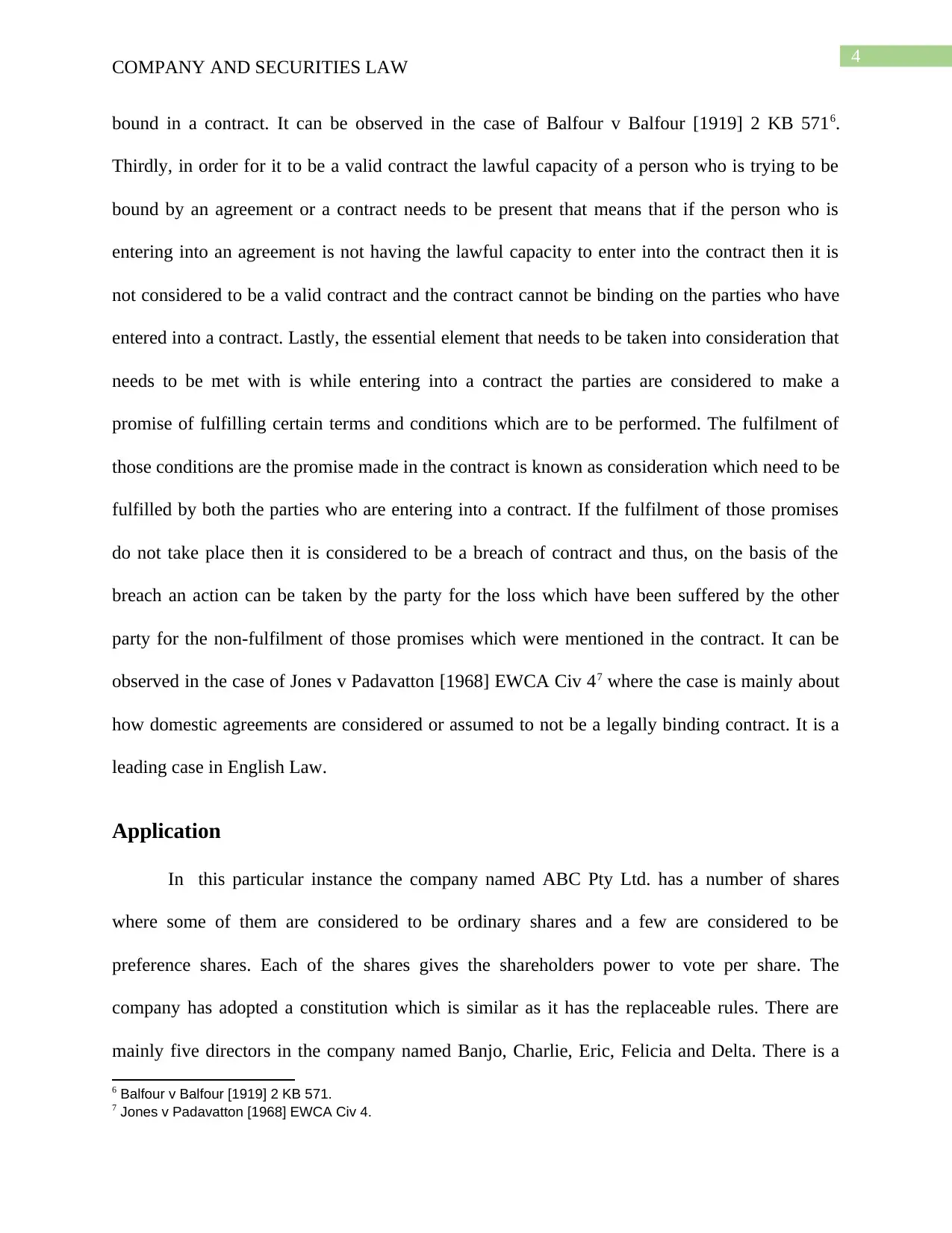
4
COMPANY AND SECURITIES LAW
bound in a contract. It can be observed in the case of Balfour v Balfour [1919] 2 KB 5716.
Thirdly, in order for it to be a valid contract the lawful capacity of a person who is trying to be
bound by an agreement or a contract needs to be present that means that if the person who is
entering into an agreement is not having the lawful capacity to enter into the contract then it is
not considered to be a valid contract and the contract cannot be binding on the parties who have
entered into a contract. Lastly, the essential element that needs to be taken into consideration that
needs to be met with is while entering into a contract the parties are considered to make a
promise of fulfilling certain terms and conditions which are to be performed. The fulfilment of
those conditions are the promise made in the contract is known as consideration which need to be
fulfilled by both the parties who are entering into a contract. If the fulfilment of those promises
do not take place then it is considered to be a breach of contract and thus, on the basis of the
breach an action can be taken by the party for the loss which have been suffered by the other
party for the non-fulfilment of those promises which were mentioned in the contract. It can be
observed in the case of Jones v Padavatton [1968] EWCA Civ 47 where the case is mainly about
how domestic agreements are considered or assumed to not be a legally binding contract. It is a
leading case in English Law.
Application
In this particular instance the company named ABC Pty Ltd. has a number of shares
where some of them are considered to be ordinary shares and a few are considered to be
preference shares. Each of the shares gives the shareholders power to vote per share. The
company has adopted a constitution which is similar as it has the replaceable rules. There are
mainly five directors in the company named Banjo, Charlie, Eric, Felicia and Delta. There is a
6 Balfour v Balfour [1919] 2 KB 571.
7 Jones v Padavatton [1968] EWCA Civ 4.
COMPANY AND SECURITIES LAW
bound in a contract. It can be observed in the case of Balfour v Balfour [1919] 2 KB 5716.
Thirdly, in order for it to be a valid contract the lawful capacity of a person who is trying to be
bound by an agreement or a contract needs to be present that means that if the person who is
entering into an agreement is not having the lawful capacity to enter into the contract then it is
not considered to be a valid contract and the contract cannot be binding on the parties who have
entered into a contract. Lastly, the essential element that needs to be taken into consideration that
needs to be met with is while entering into a contract the parties are considered to make a
promise of fulfilling certain terms and conditions which are to be performed. The fulfilment of
those conditions are the promise made in the contract is known as consideration which need to be
fulfilled by both the parties who are entering into a contract. If the fulfilment of those promises
do not take place then it is considered to be a breach of contract and thus, on the basis of the
breach an action can be taken by the party for the loss which have been suffered by the other
party for the non-fulfilment of those promises which were mentioned in the contract. It can be
observed in the case of Jones v Padavatton [1968] EWCA Civ 47 where the case is mainly about
how domestic agreements are considered or assumed to not be a legally binding contract. It is a
leading case in English Law.
Application
In this particular instance the company named ABC Pty Ltd. has a number of shares
where some of them are considered to be ordinary shares and a few are considered to be
preference shares. Each of the shares gives the shareholders power to vote per share. The
company has adopted a constitution which is similar as it has the replaceable rules. There are
mainly five directors in the company named Banjo, Charlie, Eric, Felicia and Delta. There is a
6 Balfour v Balfour [1919] 2 KB 571.
7 Jones v Padavatton [1968] EWCA Civ 4.
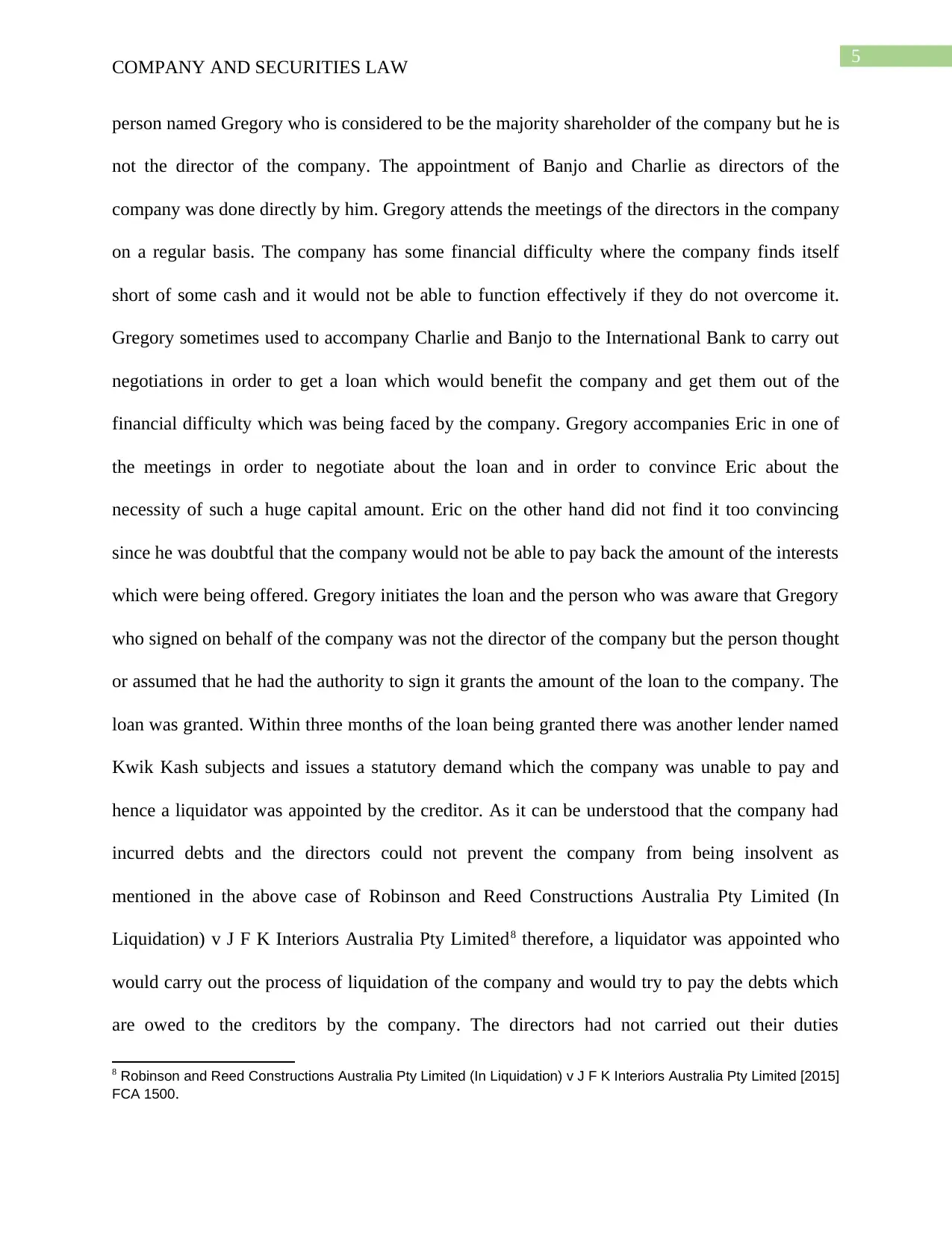
5
COMPANY AND SECURITIES LAW
person named Gregory who is considered to be the majority shareholder of the company but he is
not the director of the company. The appointment of Banjo and Charlie as directors of the
company was done directly by him. Gregory attends the meetings of the directors in the company
on a regular basis. The company has some financial difficulty where the company finds itself
short of some cash and it would not be able to function effectively if they do not overcome it.
Gregory sometimes used to accompany Charlie and Banjo to the International Bank to carry out
negotiations in order to get a loan which would benefit the company and get them out of the
financial difficulty which was being faced by the company. Gregory accompanies Eric in one of
the meetings in order to negotiate about the loan and in order to convince Eric about the
necessity of such a huge capital amount. Eric on the other hand did not find it too convincing
since he was doubtful that the company would not be able to pay back the amount of the interests
which were being offered. Gregory initiates the loan and the person who was aware that Gregory
who signed on behalf of the company was not the director of the company but the person thought
or assumed that he had the authority to sign it grants the amount of the loan to the company. The
loan was granted. Within three months of the loan being granted there was another lender named
Kwik Kash subjects and issues a statutory demand which the company was unable to pay and
hence a liquidator was appointed by the creditor. As it can be understood that the company had
incurred debts and the directors could not prevent the company from being insolvent as
mentioned in the above case of Robinson and Reed Constructions Australia Pty Limited (In
Liquidation) v J F K Interiors Australia Pty Limited8 therefore, a liquidator was appointed who
would carry out the process of liquidation of the company and would try to pay the debts which
are owed to the creditors by the company. The directors had not carried out their duties
8 Robinson and Reed Constructions Australia Pty Limited (In Liquidation) v J F K Interiors Australia Pty Limited [2015]
FCA 1500.
COMPANY AND SECURITIES LAW
person named Gregory who is considered to be the majority shareholder of the company but he is
not the director of the company. The appointment of Banjo and Charlie as directors of the
company was done directly by him. Gregory attends the meetings of the directors in the company
on a regular basis. The company has some financial difficulty where the company finds itself
short of some cash and it would not be able to function effectively if they do not overcome it.
Gregory sometimes used to accompany Charlie and Banjo to the International Bank to carry out
negotiations in order to get a loan which would benefit the company and get them out of the
financial difficulty which was being faced by the company. Gregory accompanies Eric in one of
the meetings in order to negotiate about the loan and in order to convince Eric about the
necessity of such a huge capital amount. Eric on the other hand did not find it too convincing
since he was doubtful that the company would not be able to pay back the amount of the interests
which were being offered. Gregory initiates the loan and the person who was aware that Gregory
who signed on behalf of the company was not the director of the company but the person thought
or assumed that he had the authority to sign it grants the amount of the loan to the company. The
loan was granted. Within three months of the loan being granted there was another lender named
Kwik Kash subjects and issues a statutory demand which the company was unable to pay and
hence a liquidator was appointed by the creditor. As it can be understood that the company had
incurred debts and the directors could not prevent the company from being insolvent as
mentioned in the above case of Robinson and Reed Constructions Australia Pty Limited (In
Liquidation) v J F K Interiors Australia Pty Limited8 therefore, a liquidator was appointed who
would carry out the process of liquidation of the company and would try to pay the debts which
are owed to the creditors by the company. The directors had not carried out their duties
8 Robinson and Reed Constructions Australia Pty Limited (In Liquidation) v J F K Interiors Australia Pty Limited [2015]
FCA 1500.
⊘ This is a preview!⊘
Do you want full access?
Subscribe today to unlock all pages.

Trusted by 1+ million students worldwide
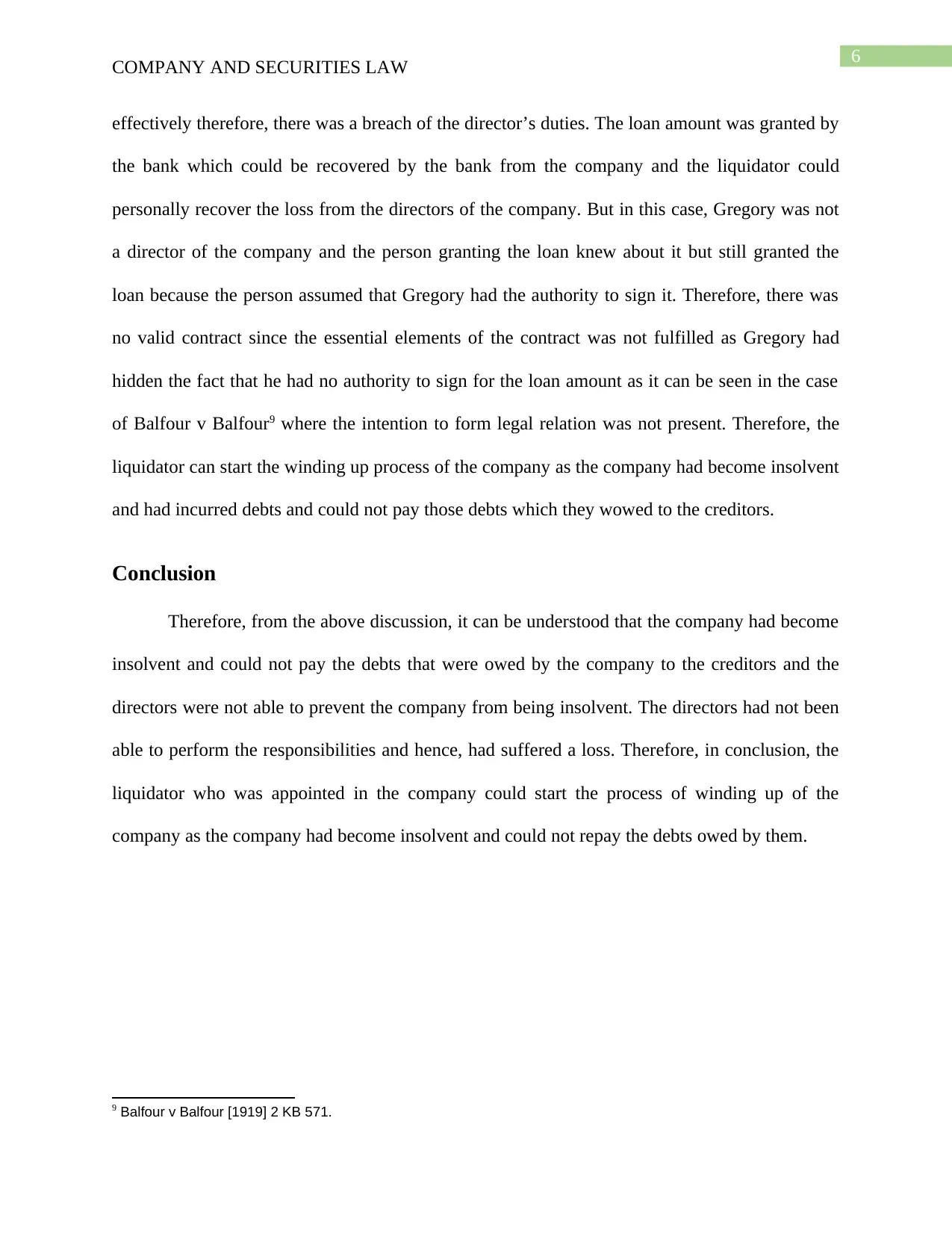
6
COMPANY AND SECURITIES LAW
effectively therefore, there was a breach of the director’s duties. The loan amount was granted by
the bank which could be recovered by the bank from the company and the liquidator could
personally recover the loss from the directors of the company. But in this case, Gregory was not
a director of the company and the person granting the loan knew about it but still granted the
loan because the person assumed that Gregory had the authority to sign it. Therefore, there was
no valid contract since the essential elements of the contract was not fulfilled as Gregory had
hidden the fact that he had no authority to sign for the loan amount as it can be seen in the case
of Balfour v Balfour9 where the intention to form legal relation was not present. Therefore, the
liquidator can start the winding up process of the company as the company had become insolvent
and had incurred debts and could not pay those debts which they wowed to the creditors.
Conclusion
Therefore, from the above discussion, it can be understood that the company had become
insolvent and could not pay the debts that were owed by the company to the creditors and the
directors were not able to prevent the company from being insolvent. The directors had not been
able to perform the responsibilities and hence, had suffered a loss. Therefore, in conclusion, the
liquidator who was appointed in the company could start the process of winding up of the
company as the company had become insolvent and could not repay the debts owed by them.
9 Balfour v Balfour [1919] 2 KB 571.
COMPANY AND SECURITIES LAW
effectively therefore, there was a breach of the director’s duties. The loan amount was granted by
the bank which could be recovered by the bank from the company and the liquidator could
personally recover the loss from the directors of the company. But in this case, Gregory was not
a director of the company and the person granting the loan knew about it but still granted the
loan because the person assumed that Gregory had the authority to sign it. Therefore, there was
no valid contract since the essential elements of the contract was not fulfilled as Gregory had
hidden the fact that he had no authority to sign for the loan amount as it can be seen in the case
of Balfour v Balfour9 where the intention to form legal relation was not present. Therefore, the
liquidator can start the winding up process of the company as the company had become insolvent
and had incurred debts and could not pay those debts which they wowed to the creditors.
Conclusion
Therefore, from the above discussion, it can be understood that the company had become
insolvent and could not pay the debts that were owed by the company to the creditors and the
directors were not able to prevent the company from being insolvent. The directors had not been
able to perform the responsibilities and hence, had suffered a loss. Therefore, in conclusion, the
liquidator who was appointed in the company could start the process of winding up of the
company as the company had become insolvent and could not repay the debts owed by them.
9 Balfour v Balfour [1919] 2 KB 571.
Paraphrase This Document
Need a fresh take? Get an instant paraphrase of this document with our AI Paraphraser
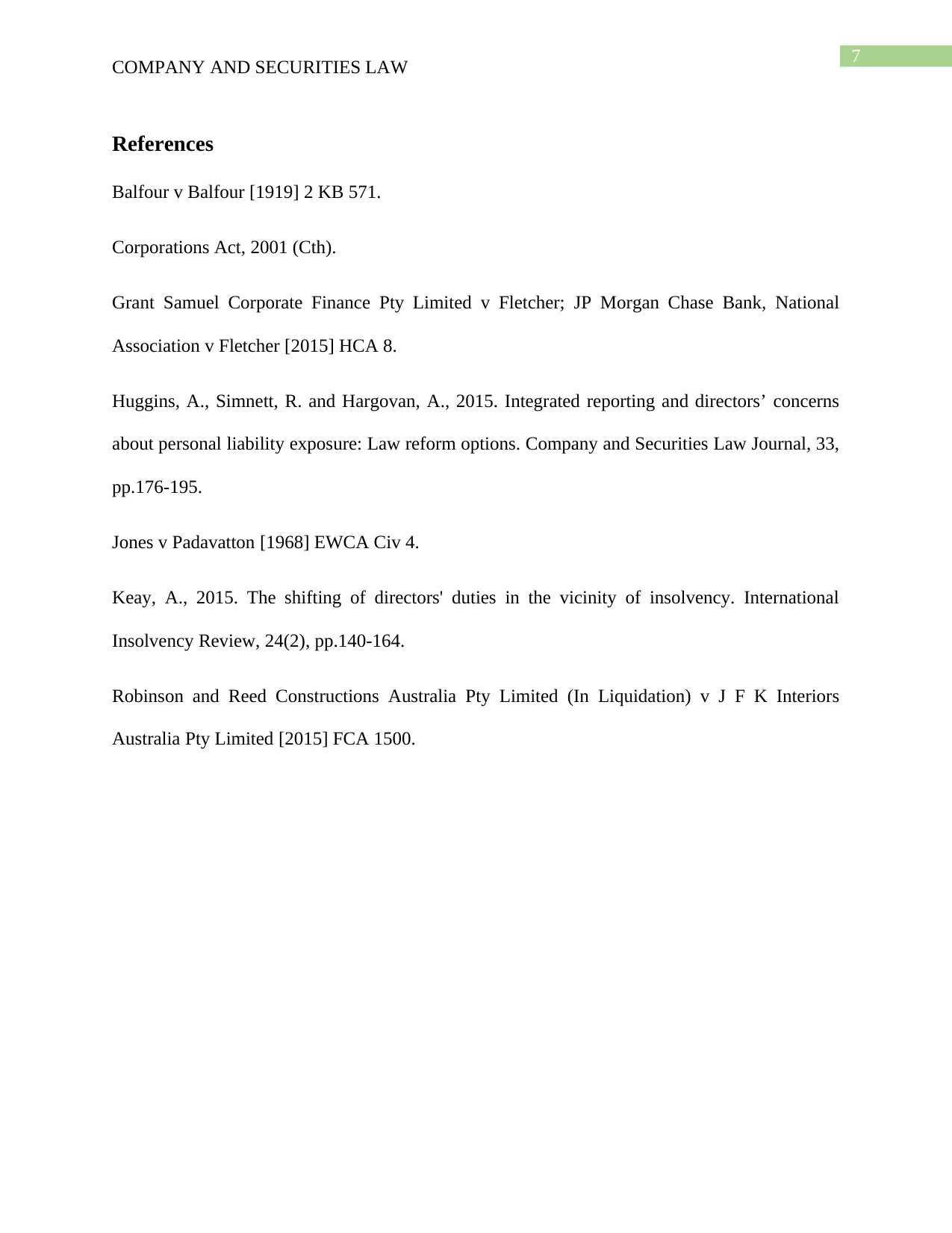
7
COMPANY AND SECURITIES LAW
References
Balfour v Balfour [1919] 2 KB 571.
Corporations Act, 2001 (Cth).
Grant Samuel Corporate Finance Pty Limited v Fletcher; JP Morgan Chase Bank, National
Association v Fletcher [2015] HCA 8.
Huggins, A., Simnett, R. and Hargovan, A., 2015. Integrated reporting and directors’ concerns
about personal liability exposure: Law reform options. Company and Securities Law Journal, 33,
pp.176-195.
Jones v Padavatton [1968] EWCA Civ 4.
Keay, A., 2015. The shifting of directors' duties in the vicinity of insolvency. International
Insolvency Review, 24(2), pp.140-164.
Robinson and Reed Constructions Australia Pty Limited (In Liquidation) v J F K Interiors
Australia Pty Limited [2015] FCA 1500.
COMPANY AND SECURITIES LAW
References
Balfour v Balfour [1919] 2 KB 571.
Corporations Act, 2001 (Cth).
Grant Samuel Corporate Finance Pty Limited v Fletcher; JP Morgan Chase Bank, National
Association v Fletcher [2015] HCA 8.
Huggins, A., Simnett, R. and Hargovan, A., 2015. Integrated reporting and directors’ concerns
about personal liability exposure: Law reform options. Company and Securities Law Journal, 33,
pp.176-195.
Jones v Padavatton [1968] EWCA Civ 4.
Keay, A., 2015. The shifting of directors' duties in the vicinity of insolvency. International
Insolvency Review, 24(2), pp.140-164.
Robinson and Reed Constructions Australia Pty Limited (In Liquidation) v J F K Interiors
Australia Pty Limited [2015] FCA 1500.
1 out of 8
Related Documents
Your All-in-One AI-Powered Toolkit for Academic Success.
+13062052269
info@desklib.com
Available 24*7 on WhatsApp / Email
![[object Object]](/_next/static/media/star-bottom.7253800d.svg)
Unlock your academic potential
Copyright © 2020–2025 A2Z Services. All Rights Reserved. Developed and managed by ZUCOL.




